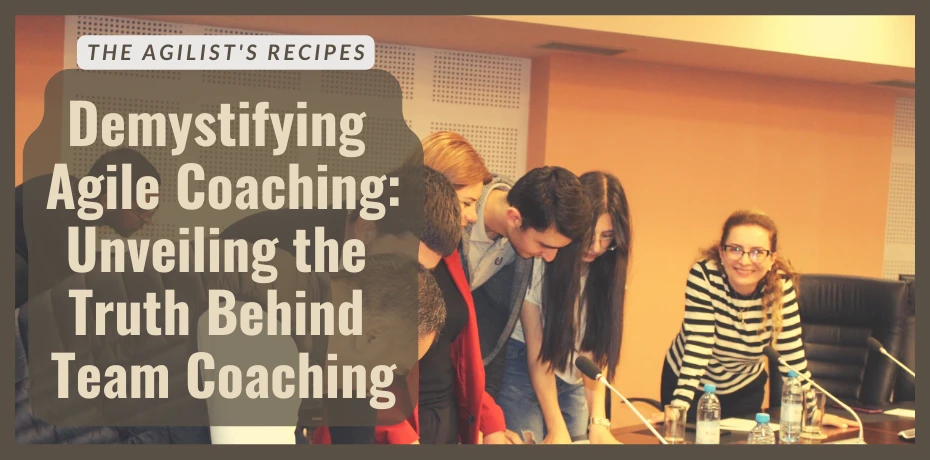Are you familiar with the common misconceptions surrounding Agile coaching? It's time to set the record straight! In this blog post, we'll delve into the five main misconceptions about Agile coaching and reveal the truth behind them. So, let's buckle up and get ready to explore the real essence of team coaching.
5 misconceptions about Agile Coaching
Misconception #1: It's about giving all the possible solutions in a zipped format to get results faster.
Admit it, we've all been guilty of thinking this way at some point. However, Agile coaching is not about providing ready-made solutions. It's about extracting all the meaningful solutions in an adaptive list, enabling teams to achieve faster results.
Misconception #2: It's about listening to all the complaints without judgment, as in a therapist's office.
While it's true that listening without judgment plays a crucial role in Agile coaching, it goes beyond being a therapist. Agile coaches provide a safe and transparent environment for team members to express their concerns, fostering open communication and collaboration.
Misconception #3: It's about setting up Agile values.
Setting up Agile values is undoubtedly important, but Agile coaching encompasses much more. It involves helping teams establish Agile values, guiding them on their Agile journey, and ensuring they embrace the Agile mindset.
Misconception #4: It's about giving advice, then throwing all the actions at others.
Agile coaching is not just about giving advice and leaving teams to figure it out on their own. Instead, coaches show the way and then actively support teams in implementing the necessary actions whenever needed.
Misconception #5: It's only about asking for solutions. It can never be about giving solutions.
Here's where we need to shift our perspective. Agile coaching indeed revolves around asking for solutions, but it can also involve providing solutions when necessary. It's all about striking the right balance and adapting to the team's needs.
Now that we've unveiled these misconceptions, it's time to reframe our understanding of Agile coaching. Let's replace a few words and see how they transform from misconceptions to the truth.
- It is about extracting collaboratively all the meaningful solutions in an adaptive list to get results faster.
- It is about listening without judgment in a safe and transparent environment.
- It is about helping to incorporate Agile values.
- It is about showing the way and then acting whenever needed.
- It is about asking for solutions. It can be about giving solutions whenever needed.
See? Things don't have to be complicated all the time. In fact, simplicity often reigns supreme, and we tend to overcomplicate matters ourselves.
Team coaching
Team coaching, as you may have realized, is no easy feat. It's not about providing teams with ready-to-go solutions that magically transform them into high performers overnight. There's a perception that Agile coaches are like fluffy creatures wielding magic wands, indulging everyone's egos and making miracles happen.
But here's the truth:
- The moment you cut off irrelevant comments and discussions, people stop seeing you as a coach.
- The moment you provide a solution to the team, they constantly ask for more.
- The moment you focus on asking the right questions, they stop seeing you as a problem-solver.
- The moment you impose an action, they think you manage them.
- The moment you give them a choice, they prefer to forget about it.
It's not a walk in the park, but as a Scrum Master or Agile Coach, you need to be all that and more to navigate various situations and choose the right approach.
Now, let's shift our attention to improving team culture and focus to enhance team performance. Well-structured team coaching sessions with a focus on agility can work wonders.
However, before diving in, a few considerations:
- Make sure there are no impending deadlines that could hinder the team's full engagement.
- Ensure that the team understands the purpose and significance of the coaching sessions.
- Have a clear plan and structure in place for the sessions.
- Prepare templates to facilitate the sessions smoothly.
When it comes to the topics to cover during team coaching sessions, certain key areas make a significant impact:
- Team members' familiarity with one another.
- Roles, responsibilities, and skill sets.
- Team values and norms.
- Product visions, goals, metrics, and team mission statement.
- Processes, practices, and events.
- Communication and conflict resolution.
- Giving and receiving feedback.
- Identifying growth opportunities and addressing gaps.
- Celebrating success.
- Establishing a working agreement.
These sessions should have a clear purpose and objective. When thoughtfully organized, they can bring immense awareness, clarity, transparency, and efficiency, especially when followed by actionable items after each session.
Coaching model - GROW
Now, let's explore an effective coaching model—the GROW model. This simple yet robust framework provides structure for your coaching sessions:
G - Goal: Establish the desired outcome or change as a SMART goal.
R - Current Reality: Understand the current situation without rushing into solutions.
O - Options (or Obstacles or Opportunities): Encourage brainstorming to explore possible options or obstacles.
W - Will (or Way Forward): Help team members commit to specific actions that will move them closer to their goal.
Think of it as a journey that empowers your team members to make superior choices, overcome obstacles, acquire new skills, and advance their careers. As a leader, your coaching role involves asking for solutions and using the GROW model as a guide.
Two essential skills for any coach are the ability to ask good questions and listen effectively. You don't need to be a therapist to have a pulse on the team's needs and ask the right questions. So, embrace your coaching role with confidence!
Conducting Team coaching sessions
Now, let's dive into how to conduct effective team coaching sessions:
- Establish preliminary agreements based on the team culture and working agreement. Neglecting this can lead to conflicts down the road. For instance, if the team has agreed to minimize interruptions and actively listen during sessions, holding team members accountable for their promises can foster a smoother facilitation process.
- Clearly state the purpose of each session at the beginning, and summarize the key observations and outcomes at the end. This reduces confusion and ensures alignment within the team.
- Start each session by reviewing previous agreed-upon actions and checking progress. This keeps everyone accountable and maintains focus.
- Maintain consistency throughout the sessions. Refer back to the agreements made and remind team members of the rules to maintain a productive and effective coaching environment.
By planning ahead and establishing clear agreements, you set the stage for productive sessions and effortless facilitation. Remember, your teams are not a group of unknowledgeable savages when it comes to Agile practices. Most of the principles and practices are already being utilized, consciously or intuitively. Your role as a Scrum Master or Agile leader is to leverage their experience and knowledge to maximize their potential.
So, build your competencies in teaching when they don't know the solutions, mentoring when they need credibility, coaching when they need guidance on applying knowledge, and facilitating when they require focus.
Lastly, when it comes to problem-solving and communication, asking the right questions is essential. Don't settle for shallow discussions or rushed solutions. Take the time to understand the problem, dig deeper, and find meaningful solutions. Don't let poor communication hinder your progress.
Now that you're armed with these insights, go forth and unleash your coaching prowess!
Remember, Agile coaching is about collaboration, continuous improvement, and achieving shared goals. Embrace the journey and empower your teams to reach new heights of performance.
Keep coaching, keep growing, and keep thriving!
Hope you found it helpful. :)
===
Whenever you're ready, there are 4 other ways I can help you:
1. Follow me on Linkedin to get daily tips on #agile, #team coaching, #scrum master growth, #agile leadership, #agilecoaching #culture
2. 💥Join our free community to taste our recipes to help you grow as an agilist and help your teams improve performance!
3. Join the Ultimate Team Performance Toolkit: a compound collection of 30 exercises, templates and strategies to measure and improve team dynamics and performance.
4. Join the Agile Team Coaching Program: A targeted coaching- facilitation system to help Scrum Masters and Agile Leaders to identify team hidden obstacles and turn those into a growth plan in 30-60 days.

